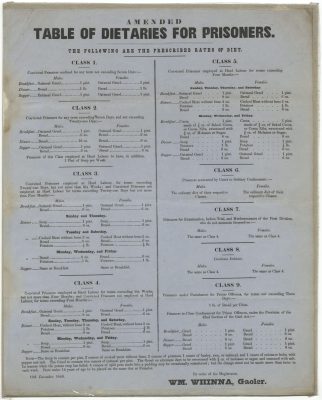Dietary of Prisoners for Berwick gaol, December 1849
Reference: BA/C/GA/2/6
Suggested age groups: KS2, KS3, KS4, Lifelong Learners
Subject areas: Cookery, History, Science
CONTEXT
This “Dietaries of Prisoners” was drawn up for the new Jail in Berwick which was opened in late November 1849. The prisoners were given different amounts of food depending on how long they were staying there, what type of work they were doing and sometimes because of what they had done. For example, Class 2 prisoners who were staying between 7 and 21 days were only fed oatmeal gruel and bread the whole time. If they had to do hard labour (breaking stones), they also got an extra pint of soup a week.
The diet for Class 4 prisoners who were doing hard labour and staying between 6 weeks and four months was more varied. Breakfast and supper were always oatmeal gruel (porridge and bread) whilst dinner was more varied – depending on the day of the week. On Saturdays, Sundays, Tuesdays and Thursdays there was some meat with bread and potatoes whilst on the other days it was just soup and bread. Men and women also received different amounts of food – normally the women were given less bread. Class 9 prisoners who had done something wrong when they were in prison were given even less food. For three days, they were only fed bread and presumably water.
The recipe for the oatmeal gruel and soup was also regulated and can be found at the bottom of the page. In March 1851 when the census was taken, there were 8 prisoners in the jail – 5 men and 3 women.
BA/C/GA/1/11 Plan of Berwick New Gaol, 1844 – Crime & Punishment
BA/C/GA/2/6 Dietary for Berwick Gaol, 1849 – Crime & Punishment
ACTIVITIES
ACTIVITY 1
Background
The prisoners were given different amounts of food depending on how long they were staying there, what type of work they were doing and sometimes because of what they had done. For example, Class 2 prisoners who were staying between 7 and 21 days were only fed oatmeal gruel and bread the whole time. If they had to do hard labour (breaking stones), they also got an extra pint of soup a week. The diet for Class 4 prisoners who were doing hard labour and staying between 6 weeks and four months was more varied.
SEE
See: What is a dietary?
See: Why were different prisoners given different foods?
See: What were Class 2 prisoners staying between 7 and 21 days fed?
See: Which prisoners were given the most varied foods?
THINK
Think: What are your thoughts on the food that the prisoners were served? How would you feel if it is what you were given to eat?
Think: What different dietary needs do men, women and children have?
Think: Do you think the prisoners were given a healthy variety of foods?
Think: How often do you repeat what you have for each meal?
DO
Do: Can you find where the Gaol was on a map of Berwick? How much has it changed?
Do: Create a drawing of the building today in the same style as the plan.
Do: Use a calorie calculator to work out the recommended calorie intake for men, women and children.
Do: Create a table showing the recommended food intake requirements for men, women and children.
Do: Create a table showing the different micronutrient categories and their purpose.
Do: Can you organise the inmates’ food into different food group and macro nutrient categories? Do you think they were getting enough variety?
Do: In groups, debate how well fed the prisoners were using the information in your tables as a guide.
Do: Create a new menu for the prisoners.
Do: Keep a food journal for a week. Make a note of each time you repeat eating the same foods.
Do: Have a go at making one of the recipes listed at the bottom of the document. How can you improve this recipe? What will you change?
Do: Write down your new, improved recipe.
Resources
OTHER ONLINE RESOURCES
Northumberland Archives video on Berwick Gaol, YouTube – https://www.youtube.com/watch?v=8DKLG8UMDrM&ab_channel=NorthumberlandArchives



